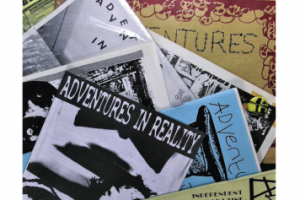
I have been a big fan of underground fanzines for as long as I can remember. It was a great way to stay connected to the music and culture I loved and still love. In my basement I have 100's DIY fanzines covering the esoteric world of punk, post punk, alternative and industrial. I love combing through them occasionally. There's always something that blows my mind that has more relevance today than when it was first published. Anyway, of all the fanzines I have collected over the years, I never had a chance to grab any one of the 13 issues of Alan Rider's Adventures In Reality. Last year the news came out that Adventures In Reality would be reissued in both paperback and hardcover. The test copies are in and Alan is very close to getting the final edits done so these books can be shipped out. Adventures In Reality is available from Fourth Dimension ( https://fourthdimensionrecords.bigcartel.com) and it documents every issue and much more. Alan takes you through the highs and lows of being a fanzine owner, contributor and editor. Let's dive and see what Alan has in store for his readers!
First, congratulations on the book. It must feel great to see this project completed. How did the idea for a book come up? Besides yourself, who else was involved?
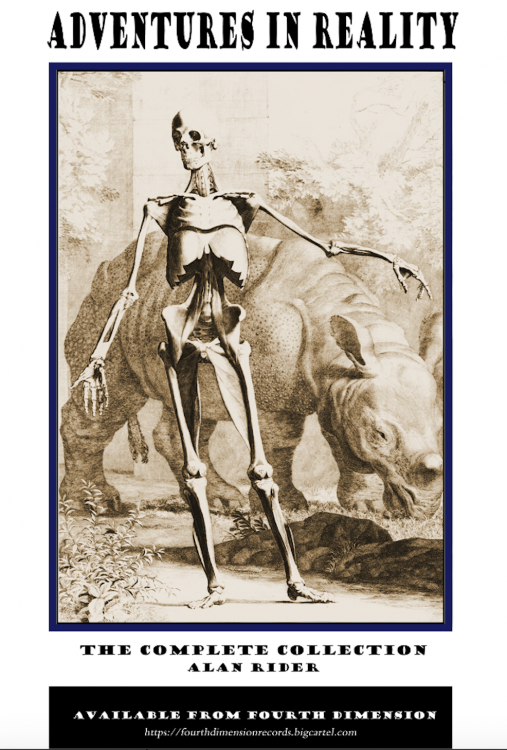
“Thanks. It has been a while in the making, though the text part of it was written over just two weeks in the Summer. Scanning in every page of the 13 issues, plus spin off zines and posters etc took a while to do as the originals are getting fragile now. I had to do a fair bit of photography for title pages etc and working really closely with the designer Puppy38, along with bouncing proofs back and forward, incorporating text corrections and additions (which I constantly came up with) and adding extra images. That probably added almost 100 pages, so it grew to quite a monster of close to 500 pages! It is called ‘The Complete Collection’ though, so I guess I filled that brief. How it came about was almost by accident really, I wasn’t pitching it. Richo from Fourth Dimension (a record label that has released Ramleh, Alternative TV and others) were starting to do books and as I went back along way with him from when he produced Grim Humour fanzine, he suggested we do a complete re-print of Adventures in Reality as it had this reputation and he felt it would fit in well with the other books they were doing.”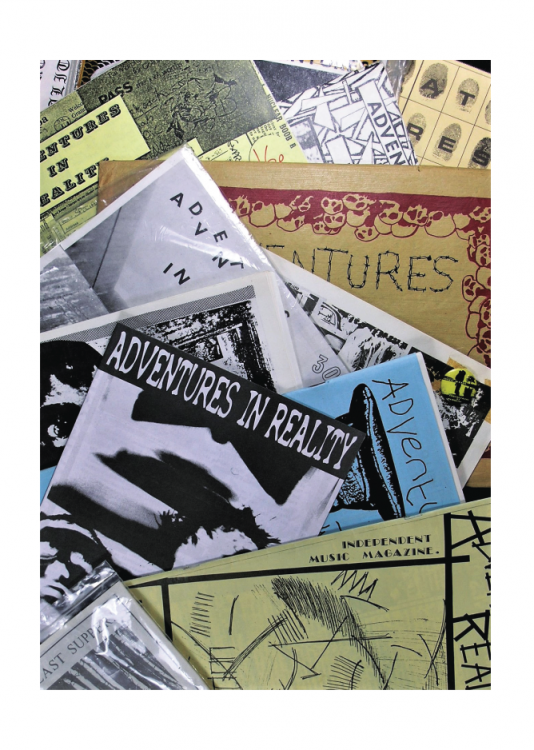
So this will be a very loaded question. DIY fanzines were a huge thing in the 80's. I remember going to the record stores hoping to find anything about underground punk music. The best resources were the local and distributed fanzines. I loved going to punk shows and buying or trading fanzines. My friends and I all dabbled in our own fanzines. It was such a great part of the underground punk culture. What was the impetus or call to action for you start your fanzine, Adventures In Reality?
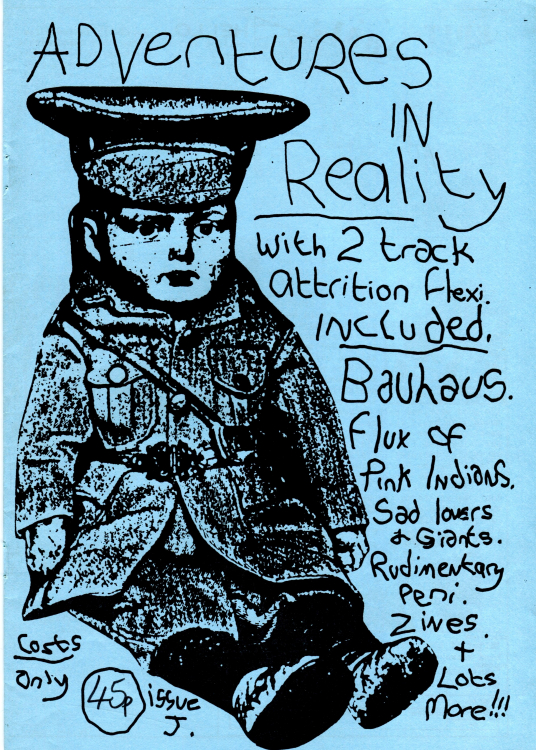
“That’s all covered in the book of course (available to order now, hint!), but I had been reading the early UK punk zines (Sniffin’ Glue, Panache etc) and also local ones and it just seemed like the right thing to do. I had been writing a few reviews for other fanzines, but you have to do it yourself really, don’t you? I agree though that fanzines were the glue that joined together many local scenes and Adventures in Reality was certainly that, though it grew to become more international by the end. The main difference between it and other zines locally and elsewhere was that it didn’t follow the accepted look of a punk zine at the time. The musical culture around post punk was a lot more open and creative than early punk was, which was largely just rock, but speeded up. The period from 1979 through to about 86 was a really fertile and varied time in England as so much was changing in society it really fed that creativity.”
Adventures In Reality was also a predominately cassette label. Fanzines and cassettes seemed to go hand in hand throughout the 80's. There were no digital copies to download or places like Spotify, Bandcamp and Apple Music to sample artists. The best way back then was trading tapes and/or releasing your own stuff. Cassette culture was huge. How did the idea to release music come about? Also, in your introduction you stated money coming from distributors of Adventures In Reality zine sometimes took a long time hence the next issue taking longer to come out. How were you able work around the finances for both the label and the fanzine? You mentioned you had to be resourceful like selling the zine to drunk locals at shows. What were some things you did to help get everything done with zine and label especially when it came to costs of production? There were noticeable differences from issue to issue.
“That’s a lot of questions! Cassette culture certainly fitted in well with the DIY counter culture ethos of fanzines so they did tend to co-exist. Describing music is actually quite hard to make interesting as all you can really do it talk about how fast or loud it is etc. A lot of bands aren’t very eloquent or interesting to talk to so interviews tend to be rather dull on the whole (with a few notable exceptions) so it’s better if people can hear it for themselves. I never really felt that just because someone is a great singer or guitarist they will necessarily have a lot to say. The industrial bands were the exception to that, and Crass. Both were intelligent and full of ideas that existed outside of just the music. That’s why the best books on music are not about the music itself, but the culture and ideas around that. So starting a cassette label made good sense to me.
As it happened, I struck lucky with my Industrial compilation ‘The Last Supper’ as that sold loads. It was distributed worldwide by Rough Trade which meant it got to a lot more places than the average tape label. I was unusual in that I always paid bands royalties of 50% of any profits. I figured that without them there would be no label so it was only fair. Some bands were amazed when they got a cheque as that never normally happened with cassette labels.
Money was always a problem though, or rather cash flow was as I was always owed money by distributors and not all of them paid quickly, or even at all. It was very hand-to-mouth at the time, and I had very little to spend on myself, but that seemed ok at the time. I just got on with it. Sometimes income from tape sales was the only money I had to live on, which was actually a quite desperate position to be in, looking back. As a result, I would use anything I could to produce the zine. I had used old hand cranked Gestetner machines to produce flyers, cheap photocopy shops, friends who could photocopy stuff at work for me after hours, and I used to pretend to be a student so I could use the local art college dark rooms to develop photos and make prints. We all used to apply for grants from the various trusts set up by the Royal Family for ‘young people’. Using their money to support counter culture felt like a bank raid on the establishment! The ever-fluctuating finances did impact on the look and feel of each zine, but in a way that was all a part of it.”
In the foreword Nicholas Bullen (Napalm Death founder) mentions the "aesthetic" of Adventures In Reality. You mentioned growing up in Coventry was a "Harsh Environment" How did this environment shape the art and direction of Adventures In Reality? Nicholas also mentioned the "free gift" with each issue of Adventures In Reality. How did you decide on what the free gift would be? With the purchase of this book, the initial orders would have an Attrition Flexi included. Please tell us a little about your mindset with this practice then and now.
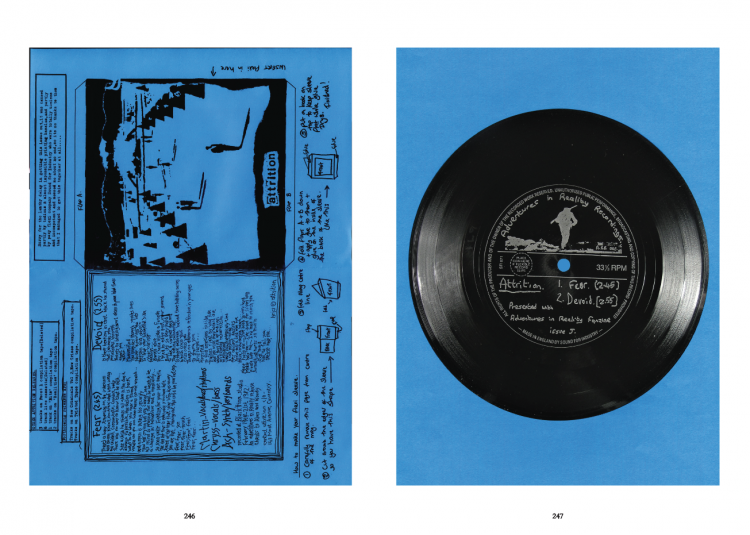
The aesthetic was just ideas that I had and images that appealed to me. There was certainly an influence from my environment and Coventry was a tough place, violent at times (it still is places), but that bred a lot of creativity and independence at the same time. A whole set of academic theories about that time have sprung up since, with courses and books covering the ‘punk aesthetic’ and talking about the design aesthetic of punk. It’s easy to ascribe all sorts of meanings to these things in hindsight, but at the time it wasn’t really like that. It was just people producing the things they liked. I did do a lecture at the local Art School in Norwich to a couple of hundred students a year or two back. They were fascinated by what it was like at the time and quoted me in their theses later, but I opened up my talk by urging them not to listen to their teachers but to do their own thing. I’m not sure that went down that well with the college, but the lecturer who invited me to do the talk got it, as he had been in a band at the same time himself.
The free gift idea came from when Horace, bass player with The Specials, gave me a load of detritus (ticket stubs, back stage passes, bills for damage, etc) from their tours to collage into a cover. There was a little sachet with a green tea bag in it from a Japanese hotel and that gave me the idea to include a free tea bag with every copy. I just kept that going after that. The limited hard cover edition of the book includes a rare copy of the original Attrition flexi from 1983 – their very first vinyl release – which was included with an issue of Adventures in Reality at the time. I had a spare box of 100 of those I’d been hanging on to since then so I thought it would be good to do something with them. They are each worth almost as much as the book costs so it’s a bit of a bargain actually.”
I got a kick out of the story about you living in a former Hells Angels chapter house with the band Attrition. I know you and Martin go way back. How did you and Martin meet and how were you able stay close for all of these years?
“Martin was doing his own fanzine at the time, Alternative Sounds, I had written a few reviews for and I met him face to face for the first time waiting outside the stage door at Stranglers gig where we were due to interview them. We never got to do that interview, but at least JJ Burnel told me to “just fuckin’ do it” when I asked him after how to start playing the bass. Good advice that I definitely acted on! After that I wrote more for Alternative Sounds, started up Adventures in Reality (which he ended up writing for eventually), and got involved with Attrition doing slide and film projections at shows after seeing an early Human League gig where they did that.
They became the Adventures in Reality house band really, as I released their early cassette albums and a bit of vinyl until they got a deal. We shared that ex Hells Angels house in Coventry and I ran a mail order (Terminal Kaleidoscope) in London with them and the Legendary Pink Dots when we moved there together. We’ve kept in touch and still talk regularly and Martin has mastered many of the reissues of my old bands Stress and Dance Naked in his studio in Coventry.”
You often called out the bands as well as your audience in your opening intro to the issue to contribute to the magazine. You also mentioned aside from some isolated contributions, you did everything yourself for no profit. Why do you think it was like this? Perhaps bands were doing interviews with other magazines/fanzines and in turn didn't feel the need to do more?
“They were all lazy apathetic bastards, that’s the truth of it. Oddly, despite it being a very creative period, it was also really hard to get people to get off their arses and do stuff. It often felt like I was doing it all by myself and why bother? But I kept going anyway. Some bands had a better attitude than others (for example The Specials never had a bad attitude), but other fanzine editors across the country were the main ones I corresponded with and kept me going with their support, and vice versa. People in bands can be very stuck up just because they can hold down a tune. That’s why I always focused on the smaller bands mainly”
Issue D was very well received. For the next issue you decided to really "push the format even further". Take us through your thought process for the controversial artwork and how that in itself had to push your creative abilities to get it released?
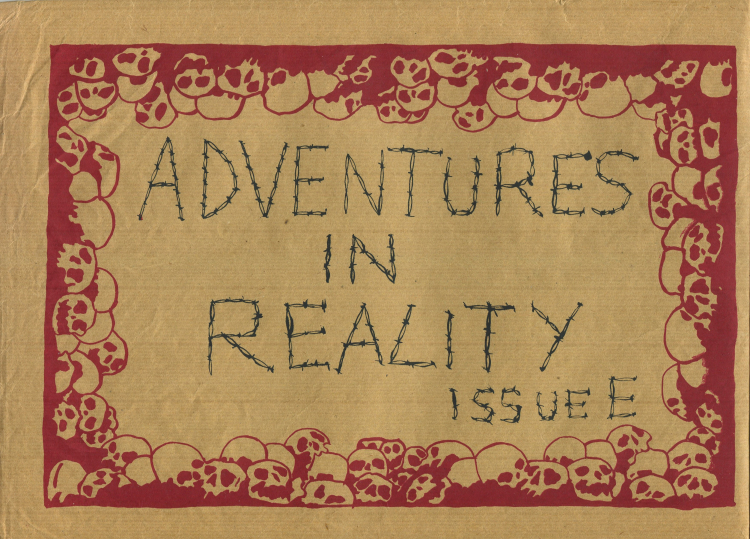
“That’s covered in more detail in the book of course, but to give you the short version of that story, I had decided to do an issue with no title on the cover at all, just a nude body art image. I knew that would be trouble and it was. Shops said they wouldn’t stock it, I had to find a new printer to print it, but I wasn’t going to cut that image so I hand screen printed 500 brown paper bags with a 2 colour design to seal it in. That took me a very long time as the bags stuck to the screens and had to be carefully peeled off every time. Only one in 2 bags were useable, but as it was a 2 colour print, that reduced to 1 in 4. It took two long overnight sessions dusk until dawn in the local art college to print enough. I never wanted to see another brown bag ever again after that, but it has since become a minor ‘punk design’ classic, featured in some books alongside better known Sex Pistols and Ramones designs.”
In Issue F, you review a GBH/Discharge gig. I found it funny in regards to Discharge that you mentioned "in case you didn't know, they play really fast and loud". Today, Discharge is heralded one of the greatest most inspirational hardcore bands to ever exist and needs no introduction. Obviously this gig was a very long time ago. When you look back at all of this, how does it make you feel about your contributions to the music you immersed yourself in for all these years? Why do you think the interest in Adventures In Reality never waned into obscurity and you're here promoting a book that documents something special to you and obviously many others to get to this point?
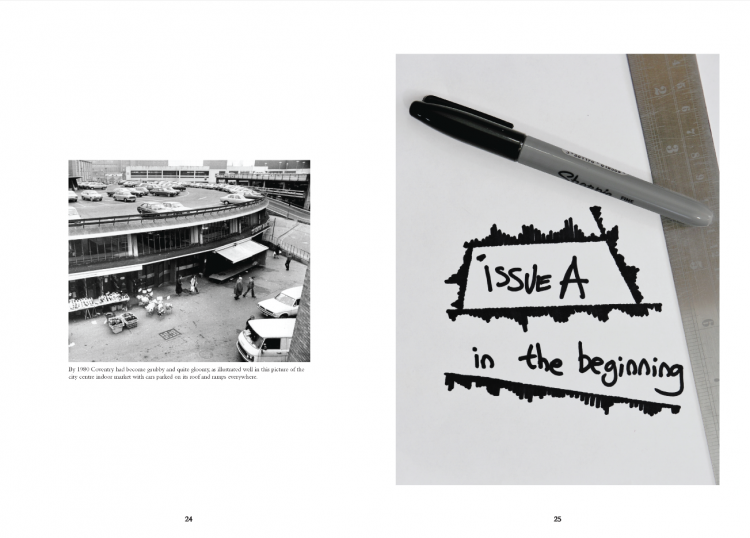
“I think that review was actually written by Andy (who later went on to form a band called The Apostles) but it was a good gig, very loud and intense and very hot and sweaty. They played with Discharge so it was a good double bill and was early on in their careers so a small club in Birmingham. A lot of bands who are a lot more well known now weren’t at the time, but there were a lot of tours going at the same time, so you could see Killing Joke, The Banshees, Dead Kennedy’s, The Clash all in the same week if you could afford the ticket price or blag your way in (I preferred the latter!). I can’t say that I contributed to that music much myself, but it was a lot of fun at the time for sure. I probably had more of a contribution to the industrial underground a little later I guess. I do often wonder why there is still this big interest in that time all these years later, but it has become clear that it was quite a unique period of change and creativity musically, so that interest is still there to hear from anyone around at the time and involved in it, even to a small extent”
You stated Issue I was a "mini landmark" as you started get a bit more international with distribution. You had an article on the LA scene exploring bands like Black Flag, Circle Jerks and TSOL. You were planning a trip to Los Angeles, but unfortunately it never happened. What were your plans?
“My plans unfortunately were not matched by my finances, which is the only reason I didn’t make it to LA at the time. It was a great scene there in that period and the bands had a real intelligence, especially Black Flag and the Dead Kennedys so I was keen to get there and meet more people on that scene as I had that connection with Flipside that would have meant I got to the right places. It was a very different place to Coventry, a bit scary to me in a way, but that’s not a reason not to go. It is a regret but I simply hadn’t the money at the time to do it.”
You interviewed many bands like SPK and Bauhaus long before they were household names. Of all the interviews you did, which interview stands out the most to you and why?
“It has to be SPK, mainly because they were an intelligent band. Their driving force Graeme was friendly and talkative. They made nice spaghetti and let me crash on their couch overnight. He sent me a bunch of tickets for their London gigs and offered me a mixing desk tape of new material from those gigs to release on The Last Supper compilation so we really hit it off. There is a lovely letter from him reproduced in the book. Bauhaus I knew through a mutual friend Alex from Venus Fly Trap, so that was an easy one, more of a chat. They were from Northampton. Which wasn’t far from Coventry and I had been to parties they had thrown previously and had exchanged zines with David Jay who did a little arty zine back in the early days of the band”
It's obvious while reading this book you were all about promoting the bands and the scene through your live reviews, album reviews and interviews. You promoted other magazines. In the end Adventures In Reality outlasted most. What was the driving force that kept you going? What would you have done differently looking back, if anything?
“If I hadn’t still enjoyed it, I would have stopped, but there was still a lot going on, especially in the Industrial scene to keep my interest going. I would have done lots differently if I had the chance over again. I would have been even more challenging and confrontational in the zines attitude. I wouldn’t have been so reluctant to use any connections (at the time I felt it was rude to press those I knew or came across in bands that were getting a name for an interview), I would have got over to LA somehow, I would certainly have pushed my band, Stress, a lot more as I now realise we were actually bloody good! I would have done a lot more with the label. The list goes on! Not regrets though, just more of what I was doing. There just wasn’t enough time and money to do it all I guess. It’s a shame that you can’t really shock and challenge anyone now and stupidity and arrogance has persisted in too many places still.”
Sticky Fingers was another fanzine you were involved in. Why this and not Adventures In Reality? I sensed a lot of satire in the pages. You even called the issues "spoof fanzines". What could you do here that you couldn't do in Adventures In Reality?
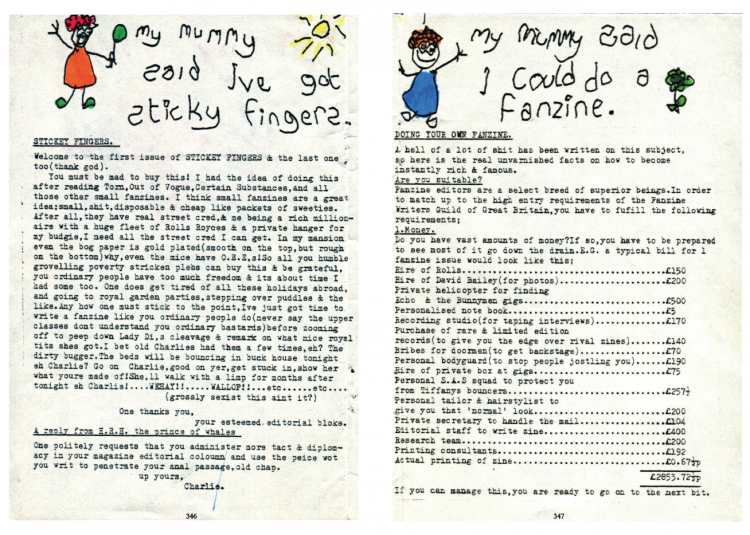
“It wasn’t a choice. I did those mini zines alongside Adventures in Reality. They were satires of a zine, taking the piss out of it all. I did them anonymously just for fun, but oddly they inspired a lot of other mini zines to spring up locally. I was also editing a more political ‘Agit Zine’ called Not The Jobhunter as well, whose sole purpose was to piss off politicians (which it did) by telling them how crap they all were. That was funded by a Queens Silver Jubilee Fund grant! That fact caused outrage locally in the press and even attracted national media attention. Ha ha. Just what we wanted. Great stuff!”
What role did the label side of Adventures In Reality play in funding the magazine if any?
“Very little. If anything it was a further drain on the cash flow, but still well worth doing as explained earlier. The constant lack of funds was by far the biggest frustration for me as it limited my ambitions – hence my applying for grants from the Queen! Thank you,Your Majesty. At least you have some use!”
Tell us about the Mummies and Madmen project that has an LP coming out on the same label that is publishing the book?
“That came about through a very similar process to the book. Mummies and Madmen were a one-off band that formed and split the same day (24th August 1983). Mummies and Madmen was never intended to have a future. They formed for the recording of one track, a mix of throbbing drum machine, synthesiser feedback, PiL style bass and scratchy, reverb drenched, guitar that contorted, evolved and mutated over the course of 20 minutes. I did a similar thing later when I formed Marianbad with members of Attrition and the Legendary Pink Dots to record a single track for a compilation album. Mummies and Madmen re-formed about a year later to record another 20 minute track. Both were then put out as a tape in 1984 on Slob Tapes under the title ‘Mummies and Madmen Grow Dark In The Sun’.
Mummies and Madmen were myself, Bob Oliver, enigmatic main man of eclectic tape label Slob Tapes and Attrition percussionist (who went by the name Gamla Stan), and the mysterious Cryptic Z Mostmen on guitar. No one actually knows his whereabouts today (though it wasn’t ever that clear at the time). And that would probably have been that, until I unearthed a previously lost copy of the tape in a box of old tapes and posted an image of the cover on Facebook. Within hours Richo from Fourth Dimension had got in touch and offered to re-issue it on vinyl as a limited edition on Winter Hill archive imprint. As with all things, Covid has delayed the release, but it should appear in stores by the Summer.”
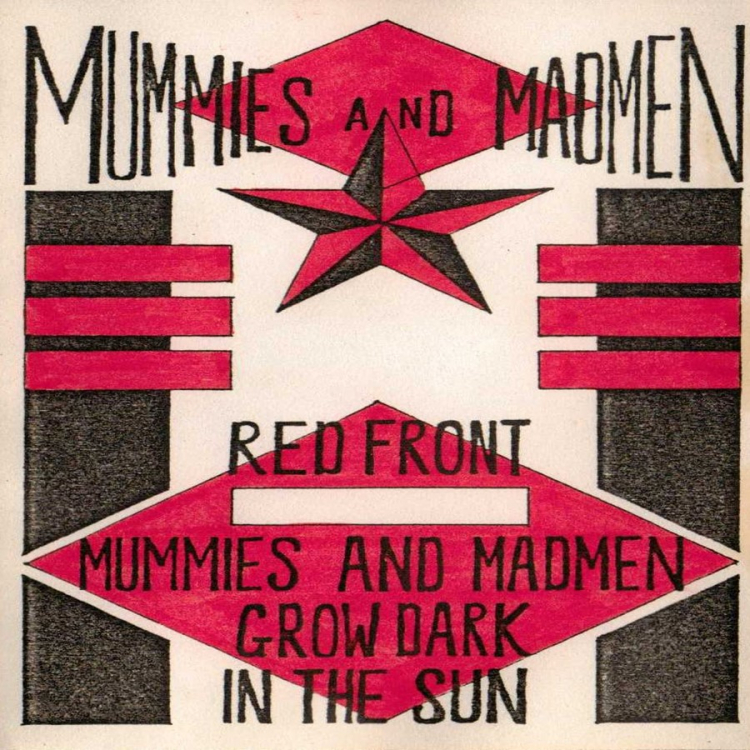
Thanks to Alan for his candid and well-thought out answers each and every time.




